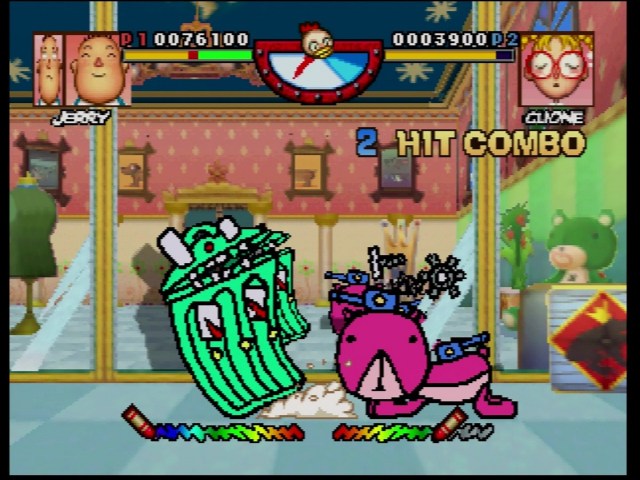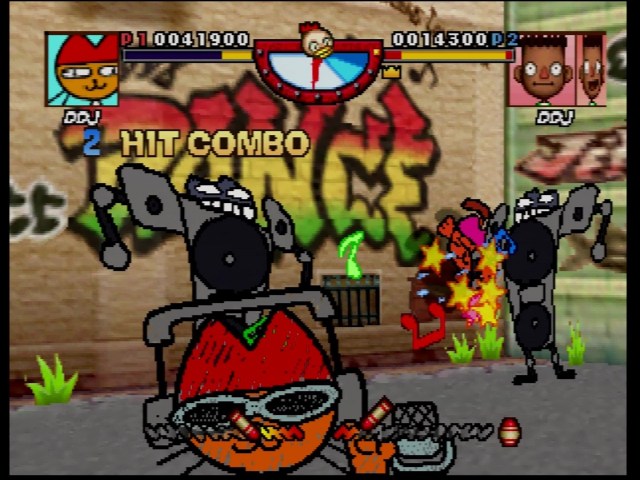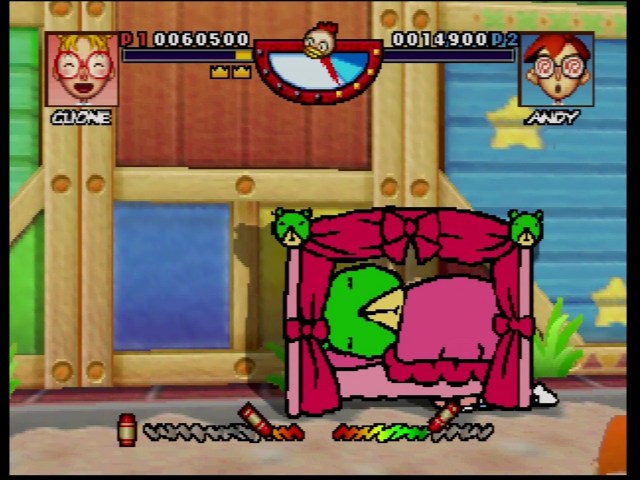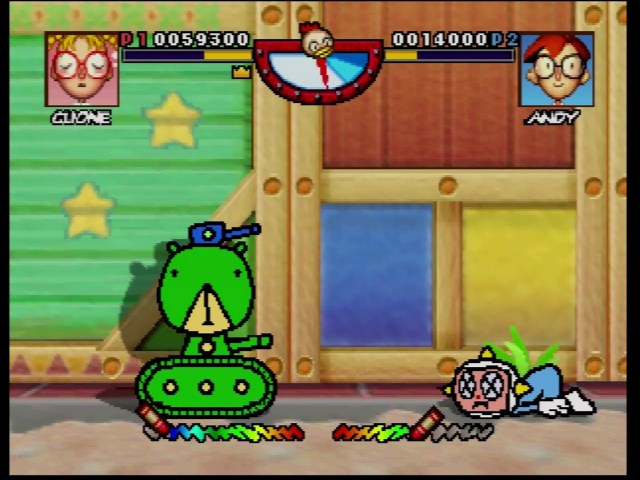Back to Kobe
I mentioned in my look at Castlevania: Legacy of Darkness that its developer, Konami Computer Entertainment Kobe, got a bit of a bad rap from their work. However, even in those sometimes maligned Castlevania efforts, there’s a spark of life that was lost in future 3D entries in the series.
It made me curious about the developer’s other efforts, but it wasn’t my intention to move directly onto another one of their titles. However, when the credits rolled on Rakugakids, I realized I must have subconsciously picked up the cue since this Japan-only N64 title was developed by Konami Computer Entertainment Kobe.
Rakugakids has always fascinated me. The N64 was kind of a horrible console when it came to fighting games. There were some decent titles, but piled on top of that was a heap of the absolute worst. Rakugakids isn’t close to being competitive with the best fighters of the era, but its unforgettable visual style makes the experience worthwhile.

The next mainstay
Rakugakids is your typical six-button arcade fighting setup. The bottom row of buttons are punches of varying speed and strength, while the top row is all kicks. There’s also the R-button, which triggers your “magical attack,” essentially just a super move. Special moves require your standard quarter-circle/half-circle flicks. It’s a pretty friendly setup. The characters don’t have very diverse special moves, so it’s rather friendly to beginners.
The one maddening part of the controls is that if you’re holding forward and hit the kick button, it becomes a throw. If you just want to kick, you have to remember not to hold forward while doing it. It’s not a big problem, but it makes the punches a bit easier to use for setting up combos, since you’re not running the risk of suddenly hugging the opponent.
We’d need Chris Moyse here for a full analysis on Rakugakids’ mechanical chops. I’m merely a dilettante when it comes to fighting games. By my approximation, Rakugakids isn’t egregiously sloppy, but it probably won’t become a mainstay of fighting game tournaments.

Cheese, ham, and onions
Where Rakugakids stands apart, however, is with its aesthetics. The story involves children finding magical crayons that they use to create proxies to beat the crap out of each other. Anything they draw with the crayon comes to life! There’s actually only one bad guy. It’s the neighborhood bully who stole a magical crayon to create his own bootylicious drawing. The less problematic children are trying to get the crayons back, but first they need to… have a tournament or something?
Anyway, the result is that the fighters have a childhood doodle appearance to them. They’re also imaginative enough that they pass for something that the diseased mind of a youthful monster would come up with. I started of with Jerry and his fighter, Robot C.H.O. Not entirely sure what C.H.O stands for. He was an okay character but a bit slow. I guess it was my mistake for not realizing how awesome Beartank is.
Beartank is a lot like Street Fighter III’s Remy in that they don’t seem to care much about what’s going on. Their behavior also resembles a bear. They only have two modes: napping and terrorizing humans. I can relate to that.
Rakugakids features only nine fighters, with two of them locked at the start. That isn’t a lot, but it’s not exactly unheard of for the era. I wouldn’t say any of them are duds. How could they be? You have a cowboy, who is a bit similar to an astronaut. There’s a cat. One is just a girl with a chicken on her head. It’s pretty rad.

Bootylicious
What’s impressive about Rakugakids is that it doesn’t look horrible by today’s standards. The visuals of the N64’s library have aged about as well as gravy, but Rakugakids kind of holds up. It helps that it didn’t stick with just being visually distinctive. Konami got a bit crafty with the graphics, with one of the stages being in front of a mirror for no reason aside from the fact that it’s cool. It sells the flat look by putting most stages right next to a wall so a shadow will be cast onto it.
There’s this weird option in the settings where you can change the combatants so they aren’t colored in. It’s neat, but I have no idea why you’d turn off the fill.
It also runs and animates really smoothly, which I am absolutely not used to seeing on the console. Like, compare it to Clayfighter 63⅓, which apparently had to cut a lot of animation to fit on an N64 cartridge. Rakugakids doesn’t have that problem. It looks and moves fantastically. I don’t know if I’ve given quite enough breathless praise to convince you of how impressive it is.

Training Mode
Rakugakids is not the most inventive game, sure, and it’s maybe a bit too simple for its own good. You can get pretty far by button mashing, especially considering the flashiest moves are executed with one button. The AI is at least good enough that it doesn’t fail the shin test, but they’re also a bit manic.
The one thing that it does that’s a bit different is allow you to train a CPU. You can go into training mode and demonstrate all your best moves. The AI apparently learns from this, and then you can let them loose on their own into a special version of story mode. It’s… kind of dumb. That AI isn’t convincing in terms of how it learned from you, and I don’t see the value of it compared to just watching two computer-controlled characters go at it. I feel like this sounded really good on paper, and when it turned out to be a lame idea, someone just wouldn’t let it go, so it made it in.

Beartank lives
Rakugakids never really made it across the ocean to North America. It was, however, released in PAL territories. The Japanese text is largely exclusive to the story narration, however. Even the settings menu is in English, so I’m not sure why it wasn’t released over here.
This is just one of those cool obscure games. The concept is unique enough to stand out, its visuals and personality are very appealing, so even though it doesn’t have top shelf gameplay, it’s still a worthwhile endeavor. Konami Computer Entertainment Kobe obviously had some affection for the property, since Beartank would find his way into cameo appearances within Castlevania: Circle of the Moon and Konami Krazy Racers. Unfortunately, after the developer was re-absorbed into Konami Osaka, the publisher would forget all about the game. That’s not surprising, considering it’s Konami, and they want people to forget they were ever good.
For other retro titles you may have missed, click right here!
Stay connected with us on social media platform for instant update click here to join our Twitter, & Facebook
We are now on Telegram. Click here to join our channel (@TechiUpdate) and stay updated with the latest Technology headlines.
For all the latest gaming News Click Here
For the latest news and updates, follow us on Google News.
